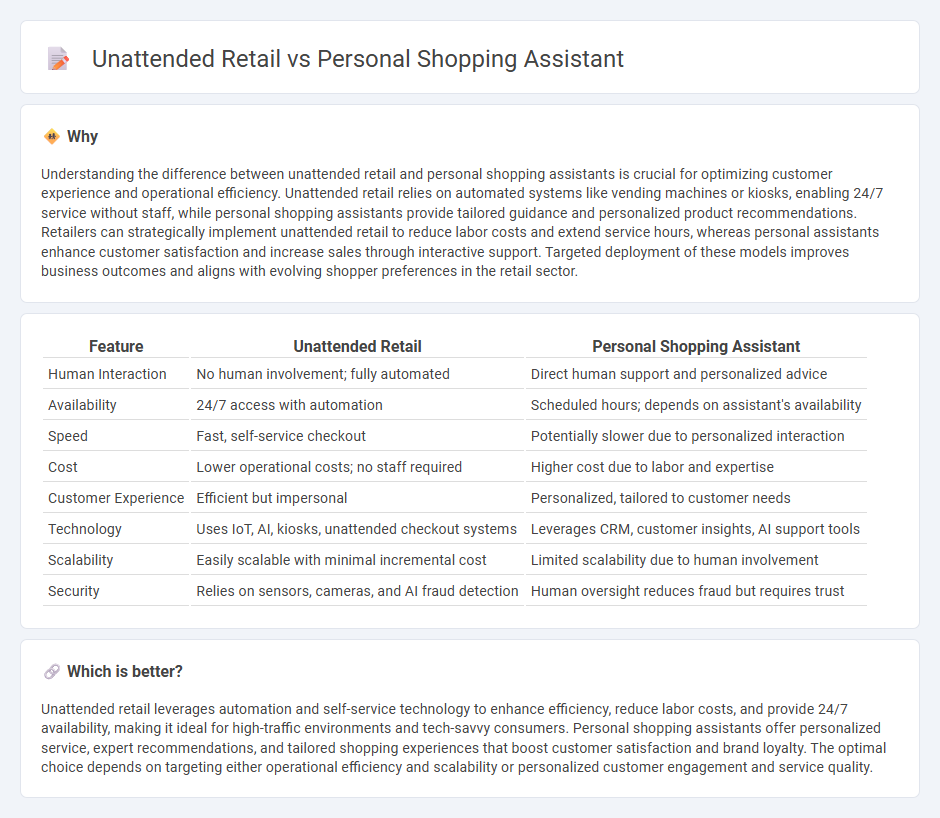
Unattended retail leverages automated kiosks and smart vending machines to enable seamless, 24/7 self-service shopping experiences without human staff. Personal shopping assistants utilize AI-driven technologies and live support to provide tailored recommendations and real-time assistance, enhancing customer engagement. Explore more about how these innovative retail solutions transform consumer interactions and boost business efficiency.
Why it is important
Understanding the difference between unattended retail and personal shopping assistants is crucial for optimizing customer experience and operational efficiency. Unattended retail relies on automated systems like vending machines or kiosks, enabling 24/7 service without staff, while personal shopping assistants provide tailored guidance and personalized product recommendations. Retailers can strategically implement unattended retail to reduce labor costs and extend service hours, whereas personal assistants enhance customer satisfaction and increase sales through interactive support. Targeted deployment of these models improves business outcomes and aligns with evolving shopper preferences in the retail sector.
Comparison Table
| Feature | Unattended Retail | Personal Shopping Assistant |
|---|---|---|
| Human Interaction | No human involvement; fully automated | Direct human support and personalized advice |
| Availability | 24/7 access with automation | Scheduled hours; depends on assistant's availability |
| Speed | Fast, self-service checkout | Potentially slower due to personalized interaction |
| Cost | Lower operational costs; no staff required | Higher cost due to labor and expertise |
| Customer Experience | Efficient but impersonal | Personalized, tailored to customer needs |
| Technology | Uses IoT, AI, kiosks, unattended checkout systems | Leverages CRM, customer insights, AI support tools |
| Scalability | Easily scalable with minimal incremental cost | Limited scalability due to human involvement |
| Security | Relies on sensors, cameras, and AI fraud detection | Human oversight reduces fraud but requires trust |
Which is better?
Unattended retail leverages automation and self-service technology to enhance efficiency, reduce labor costs, and provide 24/7 availability, making it ideal for high-traffic environments and tech-savvy consumers. Personal shopping assistants offer personalized service, expert recommendations, and tailored shopping experiences that boost customer satisfaction and brand loyalty. The optimal choice depends on targeting either operational efficiency and scalability or personalized customer engagement and service quality.
Connection
Unattended retail leverages AI-powered personal shopping assistants to provide seamless customer experiences through smart kiosks and automated checkout systems. These assistants analyze consumer preferences and purchasing behavior to offer personalized product recommendations without the need for staff intervention. Integrating personal shopping assistants in unattended retail enhances convenience, reduces operational costs, and increases sales conversion rates.
Key Terms
Personal Shopping Assistant:
A Personal Shopping Assistant provides tailored, human-guided support to enhance the shopping experience, offering personalized recommendations, style advice, and real-time customer interaction that improves satisfaction and conversion rates. Unlike unattended retail, which relies on automated kiosks or self-service systems, personal shopping assistants deliver a customized, engaging experience that addresses individual preferences and needs. Discover more about how personal shopping assistants transform retail by combining technology with human expertise.
Human Interaction
Personal shopping assistants deliver tailored customer experiences through direct human interaction, enhancing satisfaction and building brand loyalty by understanding individual preferences. Unattended retail relies on automated systems such as smart kiosks and self-checkout, offering convenience but lacking personalized customer engagement and emotional connection. Explore how integrating human interaction in retail can transform customer journeys and drive business growth.
Personalized Recommendations
Personal shopping assistants leverage AI and customer data to deliver personalized recommendations, enhancing the shopping experience by tailoring product suggestions to individual preferences and purchase history. Unattended retail systems, while efficient and accessible 24/7, often lack the nuanced understanding required for truly personalized recommendations, relying instead on generic promotions or limited user interactions. Explore how personalized AI-driven shopping assistants redefine customer engagement and boost sales effectiveness.
Source and External Links
5 Benefits of Providing Personal Shopping Assistant Online - Describes how personal shopping assistants work remotely to help clients select products fitting their style and budget, using live chat, calls, and live video to provide personalized support and execute orders.
Personal Shopping Assistant - a browser extension - Offers an AI-powered browser extension that organizes browsed products, allows price comparison across sellers, notifies on price changes, and supports shopping on over 7000 websites globally.
AI-Powered Personal Shopping Assistants Guide - Explains AI shopping assistants that personalize online shopping by providing tailored product recommendations, tracking orders, using visual search, and notifying users of promotions to enhance the user experience.
 dowidth.com
dowidth.com